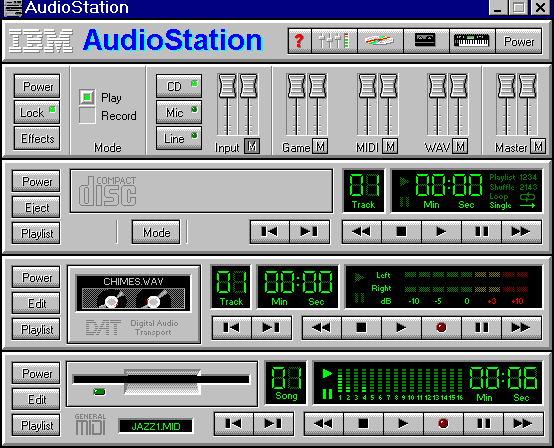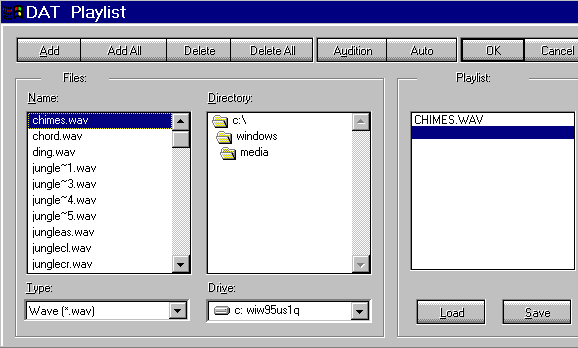

|
123.980 bytes |
Service Hints & Tips |
Document ID: PMYS-3J5PST |
Aptiva - 2144/2168 How to play WAV, MIDI and CD Audio (Mxx/Axx)
Applicable to: World-Wide
For Windows 3.1/OS2
1. Double left-click on the Aptiva Entertainment icon. This will open the Aptiva Entertainment Window.
2. Double left-click on the Music Center Icon. This will open up the Music Center Window.
3. Single left-click on the Audiostation icon.
For Win 95
1. Single left-click on the Start button, go to Programs, Aptiva Entertainment, and then single left-click on the Music Center.
2. Single left-click on the Audiostation Icon to bring up Audiostation.

Figure 1. Audiostation with All Modules Open
For Both Systems:
1. Figure 1. shows the Audiostation sections or modules starting from the top to the bottom with the PowerBar, the Audio Mixer, the CD Player, the Wave Player, and the MIDI Player modules. The PowerBar will always be at the top, but the other modules may be in different orders or not present.
2. If any of the modules are missing, single left-click to open the missing module from the PowerBar. Starting from the IBM Trademark on the PowerBar and moving right across the PowerBar, the icons are for the Audiostation help, the Mixer Module, the CD Player Module, the Wave Module, and the MIDI Module. Left single-click on the appropriate icon to open the module. If an error occurs, you will need to reload the Audiostation Application.
3. In order to do the testing; the Audiostation's audio mixer should be set to the appropriate settings. The settings are shown on the Audiostation displayed above. See if the settings on the audio mixer are the same. If the Effects button is darkened and the display on the audio mixer says Reverb, Chorus, and Treble on the left side; the audio mixer is set to display the Effects display( shown below) . Left-click on the ALL OFF button and then left-click on the Effects button to show the display above.

4. The audio mixer's settings should be:
a. Volumes all raised to the top (To raise all the volumes, place the mouse pointer on a slider, hold the left mouse button down and push it up).
b. The mode should be on Play as shown above (If it is not then left-click on Play).
c. The CD light should be on as shown above (Single left mouse click on the CD button to select the CD button).
d. None of the M or Mute buttons in the Audio Mixer should be muted. In the Audiostation above, the Input section is muted as an example of a muted control. None of the mute buttons should be set on the customer's mixer. To turn off a mute, single left mouse click on the M or Mute button.
5. The audio mixer is now setup properly to do the testing.
CD Player
To test the CD player, an audio CD such as a music CD is needed.
1. Insert the music CD into the CD-ROM drive and close the CD-ROM door.
2. The CD player should now look like the CD player in figure #1. The right side of the CD player will say Track 01. Look above at the Audiostation screenshot.
3. Single left-click on the right sided triangle, located on the right side of the square button, to start playing the CD. The music should be playing and the elapsed time counter on the CD player should be operational.
4. To stop the CD player, single left mouse click on the square left of the triangle.
Wave Player
To play a wave file through the DAT or Wave Player.
1. Single left-click on the Playlist Button in the lower left of the Wave Player module. This will bring up the Wave Player Playlist Window. Refer to the playlist show below. The first column is the name column and the third column is the playlist column.

Figure 2. DAT or WAVE Player Playlist Window
2. Single left-click on the first file in the first column or name column.
3. Single left-click on the Add Button, which is the first button at the top of the Playlist Window. This will cause the selected file to appear in the third column or playlist column.
4. Single left-click on the OK button on the upper right of the playlist screen. This will return you to the Audiostation.
5. The file should be listed in the Wave player as it is in the Wave player module shown in the Audiostation screenshot above. In this example, the Chimes.wav file is loaded. If no wave file is shown, repeat the process.
6. Single left-click on the single right triangle to play the wave file. The wave file should play and the LEDs should flash on the wave player.
7. To stop the wave file, click on the square next to the triangle.
MIDI Player
To test the MIDI player:
1. Single left-click on Playlist Button on the lower left of the MIDI Player to bring up the MIDI Player Playlist Window. The MIDI playlist is exactly like the DAT Playlist shown in figure 2 above.
2. Single left-click on the first file in the first column or name column. This will cause the file to be selected and highlighted.
3. Single left-click on the Add Button, the first button at the top left of the MIDI playlist window. This will cause the file to be added to the third column or playlist column.
4. When the file is in the playlist column, single left mouse click on the OK button on the upper right of the MIDI Playlist to close the Playlist and return to Audiostation.
5. The file should now show up in the MIDI Player. In the Audiostation example shown above, the file loaded is the JAZZ1.mid. The file selected should show as well. If the file is not named, there is no file selected. Repeat the above procedures to select a file.
6. Single left mouse click on the single right triangle to play the MIDI file. The LEDs should flash on the MIDI player and the MIDI file should be heard.
7. To stop the MIDI player, single left mouse click on the square.
|
Search Keywords |
CD-ROM | |
|
Hint Category |
Entertainment Software, Audio | |
|
Date Created |
17-06-97 | |
|
Last Updated |
17-12-98 | |
|
Revision Date |
17-12-99 | |
|
Brand |
IBM Aptiva | |
|
Product Family |
Aptiva | |
|
Machine Type |
2144, 2168 | |
|
Model |
3R0; 3R8; M60; M70; 2R5; 2R7; 2R8; M30; M35; M50; 2R6; 4R7; 4R8; M40; M54; M58; 3R4; 3R6; 4R1; 4R9; M31; M51; M52; M63; 2R9; 3R1; 3R3; 3R5; 3R7; 3R9; 4R0; 4R2; 4R3; M41; M53; M55; M56; M57; M61; M62; M71; M72; 5R5; M91; 5R1; 6R3; A10; A12; A14; 5R2; 5R6; 5R8; 5R9; 6R0; 6R4; 6R5; A15; A40; A50; A51; A52; A90; A92; A94 | |
|
TypeModel |
| |
|
Retain Tip (if applicable) |
| |
|
Reverse Doclinks |